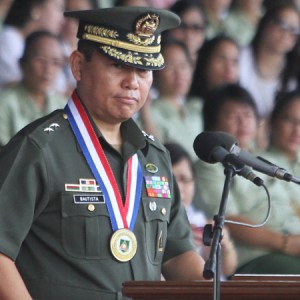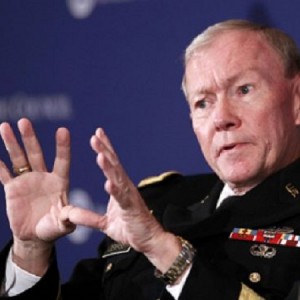MANILA, Philippines—The Philippines and the United States have agreed to establish “a joint force posture” to ensure freedom of navigation in the Asia Pacific, a region increasingly beset by maritime territorial disputes with China.
In a joint Vision Statement for Security Cooperation issued in Washington DC, Armed Forces of the Philippines (AFP) Chief of Staff Gen. Emmanuel Bautista and US Army Gen. Martin Dempsey, chair of the US Joint Chiefs of Staff, outlined steps to both tighten and broaden the defense alliance between the two countries, including an expanded US military presence in the Philippines.
“We share a common interest in the freedom of navigation, unimpeded lawful commerce, and transit of people and goods across the seas,” read the Aug. 22 statement the Philippine Embassy in Washington released to media on Saturday.
“We are committed to the principles upheld in the Universal Declaration of Human Rights and we subscribe to a rules-based approach in resolving competing claims in maritime areas by peaceful means—within the framework of international law including those reflected in the United Nations Convention on the Law of the Sea,” said the joint statement.
The two military chiefs did not directly refer to competing claims for territories in the South China Sea (West Philippine Sea) involving regional giant China, which asserts its ownership of almost all of the waters, and smaller claimant nations including the Philippines, Vietnam, Malaysia, Brunei and Taiwan.
The Philippines recently filed a complaint against China’s claimed maritime boundaries in the United Nations. China objected to “internationalizing” the issue and is seeking bilateral negotiations.
In the US-Philippine statement, it was agreed to resolve ocean-related issues through both direct talks and through multilateral venues such as the Association of Southeast Asian Nations (Asean) “in a manner that protects the interests of all who value unimpeded commerce transiting through the maritime domain, while deterring those who would restrict it or act in a manner that might place it at risk.”
‘Never been stronger’
In pursuing enhanced troop cooperation, the allies also agreed to the “joint force posture that assures freedom of navigation and provides for the common defense of each nation’s sovereign territory.”
Saying the Philippine-US alliance “has never been stronger,” the two military chiefs also vowed to pursue cooperation to face issues of mutual concern in the region, including climate change, terrorism, transnational crime and nuclear proliferation.
Bautista and Dempsey also reaffirmed the commitment to jointly pursue the “increased rotational and temporary presence” of US forces in Philippine military bases, a framework agreement in the works between the two nations.
“We expect a robust, balanced and responsive security partnership manifested in mutually beneficial bilateral military training, exercises and operations, provided by increased rotational and temporary presence of US military forces in the AFP-controlled facilities,” read the statement.
As part of joint exercises, the two forces hope to enhance troop efficiency to more seamlessly respond to humanitarian emergencies, including natural and manmade disasters. The arrangement will also pave the way for enhanced US assistance in the modernization of the Philippine military.
Bautista and Dempsey issued the joint statement last week during the AFP chief’s visit to the Pentagon, one stop in his US trip from Aug. 18 to 24.
The statement was issued ahead of US Defense Secretary Chuck Hagel’s visit to Manila on Aug. 29 and 30, when he is expected to hold wide-ranging talks with Philippine officials on the Philippine-US defense cooperation.
The allies held talks in Manila on Aug. 14 to draw up rules for temporary deployments of more US forces and military assets in the Philippines.
The negotiations are scheduled to resume in Washington before the end of the month. With an AFP report



